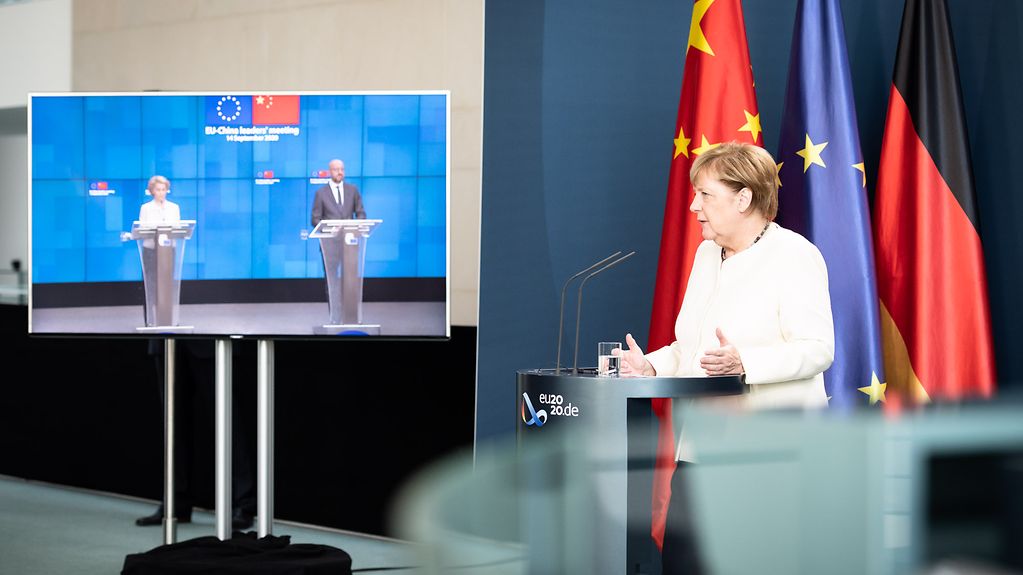EU-China video conference
Climate, investment agreement, human rights, addressing the pandemic – these were the main issues on the agenda of the online meeting between the EU and China. Chancellor Angela Merkel reported that it had been a "good, frank, open exchange of views that should be continued".
3 min reading time

Chancellor Angela Merkel at the press conference with European Commission President Ursula von der Leyen and European Council President Charles Michel - one key issue discussed with China was climate action.
Photo: Bundesregierung/Steins
It also proved possible "to address issues that are difficult, and where we are not of the same opinion from the outset, such as Hong Kong, the way we deal with minorities, and human rights," reported Chancellor Angela Merkel on Monday, following a video conference between the European Union and China.
For the EU, Charles Michel the President of the European Council who also chaired the meeting, Ursula von der Leyen the President of the European Commission and Chancellor Angela Merkel, in her capacity as head of government of the country currently holding the Presidency of the Council of the EU, took part in the video conference. China was represented by President Xi Jinping.
Dialogue in the field of climate action
One central issue discussed at the online meeting was climate action. In preparation for the Glasgow Climate Change Conference at the end of 2020, said Chancellor Angela Merkel, "a high-level dialogue is to be put in place between China and the European Union that is systematic rather than ad hoc."
In particular, there is an interest in initiating a dialogue that will look at whether China too could change its climate objectives, "in order to achieve climate neutrality more swiftly". She reported that they had also discussed the matter of shifting to different, more climate-friendly forms of energy with President Xi Jinping. The EU has a particular interest in the emissions trading system that China is currently developing. For the EU, which already has a system of this sort, this is "a very interesting opportunity to cooperate".
Investment agreement – the goal is 2020
Commenting on the investment agreement, and the aim of getting it over the line by the end of 2020, Angela Merkel said that the meeting had produced additional "political impetus" to finalise the negotiations. "It is possible." Both sides, she said, voiced a clear political will.
European Commission President Ursula von der Leyen stressed that it is not about the EU and China meeting half way on the issue of market access. Rather, the existing asymmetry must be rectified. For this, the Chinese position still needs to move, she said.
Since 2013, the European Commission has been negotiating an investment agreement with China. It is about investment protection and improving market access, in particular for European businesses. The two sides have set themselves the goal of finalising negotiations by the end of 2020.
Agreement to protect geographical indications signed
Before the summit, the EU and China signed an agreement that is to protect 100 European and 100 Chinese geographical indications, including European products like Munich beer, champagne and feta. The agreement is expected to come into effect at the start of 2021.
Next EU-China summit meeting in Brussels
A meeting was originally to be held in September in Germany, with all 27 EU heads of state or government. The COVID-19 pandemic meant that it had to be cancelled, but the summit meeting is to be staged as soon as circumstances allow. It will certainly not be possible to hold the meeting with the full complement of participants before the end of Germany’s Presidency of the Council of the European Union, however, said the Chancellor. European Council President Charles Michel has already invited President Xi Jinping to Brussels for the meeting.
Although it was not possible to hold the meeting with all EU states, Charles Michel and Angela Merkel had worked with all 27 states in advance to identify a joint EU stance vis à vis China. The Chancellor saw this as a way of ensuring "that in future we can have a more joined-up foreign policy for strategic partnerships than has perhaps been the case in the past".